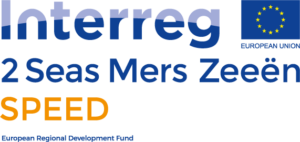The Interreg SPEED project is aimed at bridging the gap between the Data Science & IoT- market and the Western-European ports market. The project’s research team is currently working on a diagnostic toolkit for supporting high-tech smart port focused entrepreneurs in their professionalization track. Developing such a toolkit requires insight into what kind of information tech-based startups need most, when they are planning to, or in the course of growing their business.
During our research, we interviewed tech-based entrepreneurs who were willing to share their knowledge about this specific subject. Our project partner Startups.be connected us to Jorik Rombouts, founder and CEO of Rombit.
Rombit, a Belgian tech-based scale-up, offers a wide variety of innovative solutions for improving operational efficiency, safety and security within maritime services, port terminals and petrochemical plants. The company has previously taken part in one of our Hackathons, which you can read more about on the news-page of our website. In light of our research, we set up a meeting with Jorik to talk about Rombit’s growth-and professionalization track. Jorik’s entrepreneurial story combined with his port-related business knowledge fueled discussion on the possible needs of small tech-based firms during professionalization.
Growth and professionalization
One surprising insight from our conversation was the realization that professionalization of the company, as an intentional step, is often taken together with (or overlooked during) growth. Jorik confirmed that professionalization is in fact crucial for any kind of company development. The issue, however, lies not with the subject itself, but with the vagueness that accompanies its definition. Entrepreneurs usually speak of growth in many different forms, and sometimes, they might actually be referring to the professionalization of their business without being explicitly aware of it. We thus decided to tackle the issue by linking it to the hurdles that might occur during this step.
Attract the right people
Not unlike many other entrepreneurs, Jorik underlines the importance of attracting the right people at the right time. Interestingly, he not only stresses the team-aspect here, but he adds the need for individual skills.
The emotional intelligence level of an entrepreneur is key to acquiring the right people to support and help grow your company from the start. Each phase of a growing start-up is unique and distinct and thus requires specific people in order to succeed. Providing clear indications of the company’s vision and intended growth at the start is indirectly related to the right selection of a winning team.
Be willing to delegate
Professionalization usually means some kind of change. Based on his personal growth-track as an entrepreneur and the more general growth-track of his firm, Jorik explains another common barrier for entrepreneurs, namely that of letting go. Delegation is underlined in a great deal of management books as crucial, but the question to answer is “when?”. In order to answer this specific question, certain types of awareness must exist. Self-awareness of the entrepreneur regarding the growth of the company and subsequent workload is one. Another is awareness of the company as a growing business in itself, with all interrelated compartments, both internal and external.
Ask the experts
There is a significant need for the entrepreneur to understand the current situation of the company in order to be able to proceed toward its targeted vision. Jorik acknowledges the benefits that have come from starting early with asking for, and accepting advice from experts in the field, such as an advisory board. Specifically in the fast-changing field of high technology, keeping a (more than occasional) strategic oversight can prove to be immensely useful to focus on and build the vision of the growing organization.
We would like to thank Jorik Rombouts at Rombit for taking the time to converse with us for the benefit of future tech-based companies and research purposes.
For further information on the Interreg SPEED diagnostic and improvement toolkit, please contact Morane Atzmon (morane.atzmon@uantwerpen.be) or Johanna Vanderstraeten (johanna.vanderstraeten@uantwerpen.be).
To find out more about Rombit, their product and their team, please visit their website.
To find out more about Startups.be, please visit our partner page.
This research project was carried out by Johanna Vanderstraeten, Sascha Albers, Rudy Martens, and Morane Atzmon.
Johanna Vanderstraeten is assistant professor of (international) entrepreneurship, Sascha Albers is professor of international management, Rudy Martens is full professor of general and strategic management, and Morane Atzmon is Ph.D. candidate at the Faculty of Business and Economics of the University of Antwerp.
This research was supported by Startups.be and benefited from the funding of Interreg 2 Seas.




